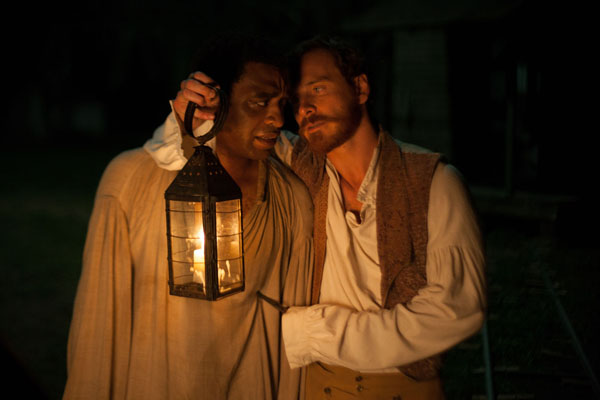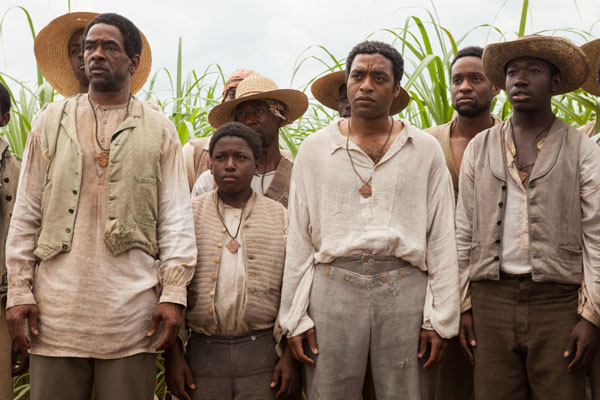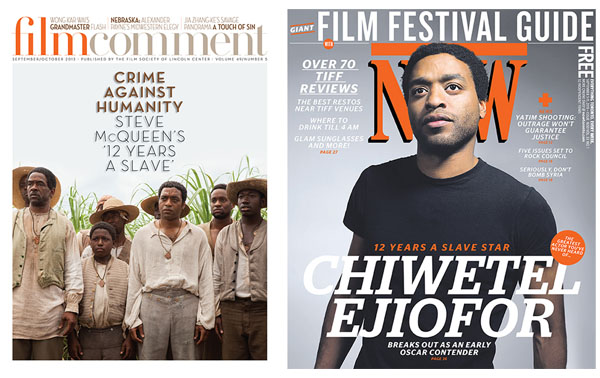“The recent popular revenge fantasy Django Unchained notwithstanding, there have been so few good and strong films about slavery in America that, for this reason alone, 12 Years a Slave stands quite tall,” begins Todd McCarthy in the Hollywood Reporter. “With director Steve McQueen dedicating himself to detailing the ‘peculiar institution’ with as many dreadful particulars as he can, Chiwetel Ejiofor leads a fine cast with a superior performance as the real-life Solomon Northup, a free black man from New York who was kidnapped in 1841 and sold into Southern slavery until being miraculously rescued. Perhaps the nature of the story is such that the film can’t help but be obvious and quite melodramatic at times, but it gets better as it goes along and builds to a moving finish.”
“Solomon’s journey from life as a respected Saratoga lawyer and family man to a fixture on several New Orleans plantations is conveyed with the same singular focus that defined McQueen’s earlier films, Hunger and Shame,” writes William Goss at Film.com. “Whereas the characters of those films (each played by Michael Fassbender) often inflicted pain upon themselves in pursuit of their passion and principles, Solomon is punished by slave traders and owners epitomized by the likes of Benedict Cumberbatch, Paul Giamatti, Paul Dano and, of course, Michael Fassbender, mostly vicious men who equate Solomon’s uncommon intelligence for common insolence.”
“‘Shame’ would have been the perfect one-word title to capture the gut-wrenching impact of [McQueen’s] third and most essential feature,” suggests Variety‘s Peter Debruge. “The first thing fans of McQueen’s Hunger and Shame will notice here is the degree to which the helmer’s austere formal technique has evolved—to the extent that one would almost swear he’d snuck off and made three or four films in the interim. Composition, sound design and story all cut together beautifully.”
“It wasn’t just the sound of sniffles but open bawling that could be heard throughout the Werner Herzog Theater,” reports Kristopher Tapley at In Contention from Telluride. “McQueen had been wanting to make a film about slavery for some time and was always looking for an in. He had the idea of a free black man kidnapped into slavery and started working on a script with John Ridley (whose work on the page with this vintage dialogue is absolutely exquisite). McQueen’s wife suggested a book he had never heard of, an autobiography of just the sort of character he had in mind… ‘As soon as it was in my hand, I couldn’t put it down,’ McQueen said of the book in the post-screening Q&A. ‘It was just riveting. Every page I turned, I just couldn’t believe what I was reading. I live in Amsterdam and for me it was like reading Anne Frank’s diary for the first time. And 99% of people I spoke to had never heard of it. It was a passion.'”
“McQueen gives [Ejiofor’s] talent the same room to breathe that he does the story, peppering the movie with patient long takes that often build into exceptional set pieces,” writes Indiewire‘s Eric Kohn. “In one near-death encounter, Northup stands on his tip toes with a noose around his neck, gazing and gasping at the surrounding plantation while the minutes crawl by. Later, at a funeral for a fallen slave, his fellowmen deliver a moving rendition of the cotton field staple ‘Roll, Jordan, Roll,’ and McQueen’s camera presses in on Ejiofor’s face as the man gradually joins in. The scene effectively completes Northup’s transformation into the role of victim that he initially resisted.” And “the mounting sense of dread never lets up.”
As “slave-breaker” Edwin Epps, “Fassbender, in what could have been a mustache-twirling part, is utterly transfixing as the kind of guy who really does have a deeply emotional investment in manic racial sadism,” writes Chris Willman at the Playlist. And Lupita Nyong’o, “as Epps’s slave mistress, who actually manages to get privileges taken away, not added, for her sexual services, is a heartbreaker in every way. She’d steal the movie if it weren’t Ejiofor’s performance, but few actors could pull off the combination of dignity and torment he manages here.”
“For all McQueen’s considerable skills as a filmmaker, 12 Years would not succeed without Ejiofor’s incredible turn,” agrees Gregory Ellwood at HitFix. “12 Years also features gorgeous cinematography by another longtime McQueen collaborator, Sean Bobbitt, and one of Hans Zimmer’s more moving scores in some time.”
Having premiered at Telluride, 12 Years a Slave will be a Special Presentation in Toronto and, as the Film Society of Lincoln Center’s Brian Brooks announced on Friday, it’s been added to the Main Slate of the New York Film Festival.
Update: 12 Years is “an impressive blend of radical and conventional movie techniques,” writes the New York Times‘ A.O. Scott. “Its violence is appropriately harsh, given Mr. McQueen’s determination to illustrate the full cruelty of American slavery, but it is also emotionally accessible and thought-provoking in a way that should engage audiences and extend the discussions about race and film that have rippled around The Help, Django Unchained, Lincoln, and more recently Lee Daniels’ The Butler.”
Updates, 9/4: Inkoo Kang talks with McQueen for the Voice: “Even as his work has become more political, McQueen remains tight-lipped about his personal views. He’s particularly hesitant to conjecture aloud why slavery has been so underexplored in cinema, especially when, as he claims, its supreme importance in world history makes it compelling subject matter. ‘Maybe it’s difficult to come to terms with because its history is such a dark one,’ he offers. ‘The Second World War is quite dark, isn’t it? I don’t know. They make a lot of Second World War films. And the Wild West.'”
Updates, 9/7: “Suspend the betting, close the books, and notify the engraver,” commands Vulture‘s Kyle Buchanan. “I’ve just seen what will surely be this year’s Best Picture winner, and it’s 12 Years a Slave. There’s no question in my mind that this will be our ultimate awards season victor… In fact, I’ll go one further… no, two further: Not only will 12 Years triumph in the Best Picture category, but I’d put my money on a historic Best Director win for Steve McQueen, and I’d mark Chiwetel Ejiofor as the frontrunner for Best Actor.”
Similarly, the Guardian‘s Catherine Shoard, who saw the film met in Toronto with “gasps, audible tears, a smattering of appalled walk-outs, and a prolonged standing ovation… If the notion that 12 Years a Slave won’t win the best picture Oscar seems absurd to those who’ve seen it, the idea that it wouldn’t take the audience award—the sole honor at the Toronto film festival—is plain insane.”
“Despite Twitter’s best efforts,” counters Ben Kenigsberg at the AV Club, “it’s not likely that 12 Years a Slave (Grade: B+) conquered the Oscars—or racism in America—in the course of a single screening. That kind of reaction is a disservice to the film Steve McQueen has actually made, which is not simply ‘about slavery,’ but another in the director’s portraits of self-denial…. 12 Years a Slave becomes a story of survival and, to some extent, martyrdom, in the sense that staying alive requires acquiescing to an unjust system…. Marred by a few distracting cameos and an overwrought Hans Zimmer score that, at least on first listen, sounds almost identical to the Shame score, this is nevertheless a powerful, vividly rendered film, with a depiction of slavery that’s less expansive but more stark than that seen in the Boschian atmospherics of Richard Fleischer’s Mandingo (1975) or Tarantino’s movie-ized Django Unchained (2012)…. It’s unquestionably a film to be seen and argued over—but don’t call it Oscar bait. It’s better than that.”
“[I]t’s the nobility of this remarkable film that pierces the soul,” writes the Telegraph‘s Tim Robey. “Even the smallest roles—Alfre Woodard’s one stellar scene as an ex-slave comfortably ensconced in her master’s favor, Brad Pitt’s pair of them as a proponent of emancipation from Canada—give the movie new angles from which to survey the culture it’s revisiting, a life of such daily abuse and iniquity that nature itself seems out of joint. McQueen’s regular collaborators, especially cinematographer Sean Bobbitt and editor Joe Walker, help him keep ruthless focus without sentimentalizing in the slightest, and find glimpses of terrible beauty in this inferno which never feel over-aestheticized.”
A “sense of terror is alive in almost every scene,” writes Entertainment Weekly‘s Owen Gleiberman. The film “evokes the lives of African-American slaves as the nightmare it was, with violence spun into a daily fabric of brutality, one that’s neither heightened nor exaggerated, just scarily real. Forget the earnest and epochal (but, in hindsight, not really raw enough) TV mini-series Roots, forget the baroque exploitation of Mandingo, and—despite the overstated accolades it received—forget Django. As a drama of the slave experience, 12 Years a Slave renders them all irrelevant. It is a new movie landmark of cruelty and transcendence.”
Updates, 9/8: “Stark, visceral and unrelenting, 12 Years a Slave is not just a great film but a necessary one,” writes Paul MacInnes in the Guardian. “It pulls no punches. But neither does it lecture.”
From Tim Grierson, writing for Screen Daily, “special kudos go to Sarah Paulson, who plays Fassbender’s vindictive wife, her contempt for blacks and her philandering husband combining to twist her face into a mask of anger.”
“I don’t know know how to start writing about this film,” confesses Movies.com‘s Erik Davis, trying not to sound like “I’m a salesman outside your door hocking another movie about slavery…. You haven’t seen a movie about slavery like this before.”
“What’s not being widely acknowledged about the movie,” notes A.A. Dowd at the AV Club, “is that it’s not just the best feature McQueen has yet made, but also—for all its unflinching brutality—also his most conventionally satisfying. Don’t let me be misunderstood: There’s nothing middlebrow about the film, which tackles the nightmare of American slavery without sentimentality, nor with the need to provide comeuppance or catharsis…. Yet when held up against McQueen’s other pictures…, this new one looks undeniably classical in construction. It is, first and foremost, a triumph of storytelling, one less concerned with inspiring awe through aesthetics than investing viewers in its narrative.”
Update, 9/9: At Indiewire, Eric Kohn interviews McQueen and Noah Taylor talks with Ejiofor.
Updates, 9/11: “One wonders,” writes Adam Cook in the Notebook, “if McQueen could make a film without such ‘difficult’ subjects—to an extent, ‘difficult’ subjects can be easier for a filmmaker in that they command a default level of reverence from the get-go, and regardless of the success in their making inevitably always have a head-start in earning prestige. I entered the film skeptical, and although it is in many ways uneven and still falls victim to some of McQueen’s nasty habits, for the most part it’s dramatically compelling, beautifully acted, and visually and aurally sophisticated.”
Solomon’s “saving grace,” writes Time‘s Richard Corliss, “is the saintly dignity with which he endures and, for posterity, observes his own and a nation’s shame. The gentle center of a satanic land, he provides the eyes and soul of 12 Years a Slave—a document that is raw, eloquent, horrifying and essential.”
“The film’s most fascinating scenes explore the phenomenon of favoritism and the use of language in defining the scarce rights and dignities of African-American slaves,” writes Tina Hassannia at the House Next Door.
Time Out New York‘s Joshua Rothkopf: “Ferocious and inspired, it’s a mandatory piece of historical reclamation—from a British director, no less.”
Kristin McCracken interviews McQueen for the Playlist.
Update, 9/12: Indiewire‘s Eric Kohn interviews Ejiofor.
Updates, 9/14: “McQueen, as is his wont, is largely content to craft images and sounds that strongly convey atmosphere and evoke great horrors, but are less visualizations of human feeling than artistic posturing,” writes Slant‘s Ed Gonzalez. “Like Hunger and Shame before it, 12 Years a Slave is a chronicle of the body as a prison. In Hunger, his debut feature, McQueen rendered the brutal captivity of Irish Republican Army martyr Bobby Sands as an ostentatious museum exhibit. His follow-up, Shame, was a heroically performed peep show as art installation, and one that confirmed McQueen’s fixation on bodily experience and almost pathological aversion to psychological inquest. In the equally cagey 12 Years a Slave, Solomon remains a mystery to those around him, as knowledge of his previous status could lead to his execution, but like the tortured souls Michael Fassbender played in McQueen’s earlier films, he also remains a cipher to audiences.”
“The film is a strong work of cinema,” counters Manohla Dargis in the New York Times. “What makes it an exceptional one, though, isn’t the awards it will pick up, but how effectively and, for the most part, unsentimentally Mr. McQueen reveals slavery’s machinery of terror. Much as Roman Polanski did in his World War II film The Pianist, which shows how the Nazis sought to dehumanize Jews, Mr. McQueen examines how human beings in America were transformed into capitalist chattel.”
“When I assess my feelings about supposed Best Picture frontrunner 12 Years a Slave, a film I ultimately disliked save the knockout performances and select unshakable parts,” writes R. Kurt Osenlund at the House Next Door, “there’s a voice in my head telling me, ‘You’re kinda eating your own words.’ I’ve been very vocal about my adoration for Lee Daniels’ The Butler, and a lot of that love springs from the appreciation and acknowledgment that we’ve been gifted an epic film about black history, from a black director, that unflinchingly and unapologetically depicts the racist atrocities that have stained our country’s past. Fast-forward (or, rather, wind the clock back) to Steve McQueen’s 1800s-set slavery horror show, and you’re ostensibly looking at the same thing. So, the objective now is to point out the differences.” Which he then sets out to do.
At Grantland, Mark Harris cautions against jumping the gun and declaring 12 Years the inevitable winner of the Oscar for Best Picture.
Update, 9/17: Calum Marsh interviews McQueen for Film.com, while Anna Tatarska interviews Ejiofor for Slant.
Update, 9/19: “It is the kind of galvanizing work that actually matches the hype,” writes Patrick Z. McGavin at Filmjourney.org. “McQueen, like Claude Lanzmann’s great Shoah, exists to bear a particular kind of witness. Like Lanzmann’s masterpiece, it is great filmmaking shaped to a subject that stands outside our ability to ever explicate.”
2013 Indexes: Telluride and Toronto. For news and tips throughout the day every day, follow @KeyframeDaily on Twitter and/or the RSS feed. Get Keyframe Daily in your inbox by signing in at fandor.com/daily.






